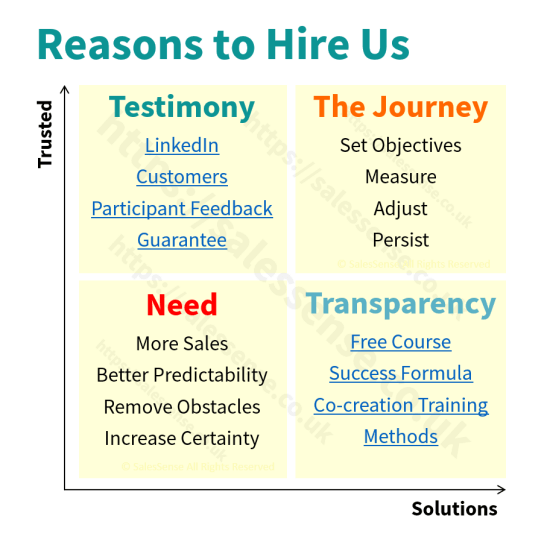Channel sales training for alliance, distributor, reseller, and VAR account sales managers.

Accelerate partner sales performance. Reduce time spent on non-sales issues, improve predictability, and increase results with our fifteen-session channel sales training course.
How is this course different?
- Participants are expected to review the content before each session.
- The training is aligned with commonly held best practices. See a detailed list at the bottom of this page.
- Session time is spent creating implementation plans and practising execution.
- The sessions require full involvement in forethought, planning, and preparation.
- The training facilitates the creation of a consistent process.
- Participants create workplace actions to embed learning in routines and habits.
- There is an option for one-to-one learning.
- The course is facilitated by the author.
- Guaranteed results.
Selling ' through' is different from selling 'to'. Affecting results through a distributor, a reseller or a business partner depends on a different set of skills and habits. Channel sales training bridges the gap.
This course provides the elements missing from traditional, end-user sales training and addresses the needs of channel account managers, distribution account managers, and alliance managers.
Request more information or have us call you with this link.
Build an effective and reliable sales channel, distributor, or business alliance. Create Partner loyalty and mutual success.
Channel Sales Training Objectives
- Get more time with principals.
- Establish trusted advisor status with senior executives.
- Develop the kind of loyalty that protects against competitors.
- Increase the relationship's strategic significance.
- Identify the accounts that are worth extra effort.
- Understand customer issues from their perspective.
- Have partners keep their promises.
- Develop partner knowledge and competence.
- Motivate partner staff.
More than 74% of all alliance agreements including those with agents, dealers, resellers, distributors, and business partnerships, fail to achieve expected levels of business.
Partnerships are easy to start and very difficult to make work. Channel sales training provides account managers with the methods, tools and skills to develop lasting and profitable business partner relationships.
Gain a method for success and hundreds of ideas, tips, and procedures for helping partners succeed. Put learning to use immediately to push aside unproductive and unimportant work for tasks and actions that bring long-lasting productivity improvements and increased results.
Who Should Attend
All those who are responsible for setting up and maintaining B2B partnerships. Typical roles include agent managers, dealer and reseller account managers, distributor account managers, and business alliance managers.
Course Content
Introduction: Course objectives and intended outcomes.
Differences: Common resale partner challenges.
Qualification: Identifying partner strengths and weaknesses.
Understand Partner Issues: Adopting a partner's perspective.
Trusted Advisor: How to assess and improve standing.
Authority: How to be accepted as a management consultant.
Teamwork: How to put yourself on their team.
Pipeline: How to create a flow of new partner opportunities.
Influence: How to mentor their key people.
Mind Share: How to educate their staff.
Develop Partner Sales Skills: How to teach without being a trainer.
Business Collaboration: Establish a process of joint planning.
Partner Loyalty: Establish strategic partner status.
Review and Next Steps: How to transform learning into results.
Additional Benefits
- Flexible multi-session 'learning by doing' structured training.
- Workplace assignments develop new habits and practices.
- Tools, templates, frameworks, and examples save time and aid learning.
- Common language improves communication and teamwork.
- Promotes adoption of best practice habits and methods.
- Increases productivity, consistency, and results.
- Improves job satisfaction and motivation.
- Reduces staff turnover.
Channel Sales Training Delivery Options
- One to One - Twelve 1-hour or six 2-hour virtual classroom sessions with the course author.
- £1295 - Learn more.
- One to One on a per-session basis. Select from the course content.
- £150 per 1-hour session - Learn more.
- Group training - Twelve 1-hour or six 2-hour virtual classroom sessions with the course author.
- £4195 for up to fifteen people - Learn more.
- Group training on a per-session basis. Select from the course content.
- £450 per 1-hour session for up to fifteen people. Learn more.
- Fees exclude applicable VAT.
- Traditional Classroom
- Delivery takes place over one or more days at a conference venue or the customer's offices.
- Contact us for fees.
What are the best practices for managing business partner relationships?
Managing reseller and distributor relationships effectively ensures smooth operations and maximises business growth. Best practices for managing these relationships, particularly in the UK, focus on communication, trust-building, and strategic alignment. Here are key insights that guided the design of our channel sales training course:
1. Start with a Transparent Contract
Business partnerships rest on well-structured contracts that cover key aspects of the working relationship. In particular, this should include how pricing is managed, payment expectations and penalties, the communication of delivery schedules, sales targets, marketing support, and termination conditions. Such contracts normally present a list of supplier as well as partner obligations. The contract should make it very clear who is expected to do what.
2. Regular Business Reviews
Ensure that both sides understand expectations, goals, and performance metrics. A good way to do this is to develop a joint plan that details what will be done and who will do it. The plan should recorded in a living document separate from the contract. Contracts are fixed and rarely changed. A working plan is a flexible tool for managing the collaboration between the parties. It can be used by both parties to review progress, adjust strategies, and reset expectations based on the results achieved.
Conduct quarterly formal business reviews to review performance, revisit goals, and discuss new opportunities and any necessary adjustments. Use these sessions to reinforce the partnership, communicate any new strategic directions, and align on shared objectives. A joint plan records all of the data to be reviewed and provides a place to record any new strategies or adjustments.
Against the backdrop of formal reviews, partner managers should continually monitor and discuss performance metrics and KPIs (Key Performance Indicators) to track partner success. Discussing KPI results is an easy way to deliver constructive feedback and offer suggestions for improvement where needed.
3. Goal Alignment
Partnerships thrive when the arrangement serves both the supplier's and partner's goals. Partner managers should articulate the alignment often and with passion. Align your products, messaging, and marketing with partner capabilities and needs. Tailor promotions, pricing, and messaging to fit the markets they serve. Encourage them to provide market insights and feedback, helping you to fine-tune product offerings or identify new opportunities.
4. Joint Marketing
It is important to ensure that partners take full advantage of marketing support included in the agreement because this multiplies the investment in marketing and business development for both parties. Partner managers may need to take the lead and ensure that partners make full use of supplier co-op marketing funds, marketing resources, and special programmes.
5. Roles and Responsibilities
Clarify the specific partner and supplier roles to avoid overlap and confusion. This is particularly important for lead generation and follow-up because both parties may carry out aspects of these activities. A joint plan is a good place to document these expectations. Clearly define product, territory, market, and account boundaries to avoid internal competition and maintain focus.
6. Support and Training
Provide comprehensive partner sales and product training. Ensure relevant partner staff are well-versed in the product's features and benefits and how to position and sell them. Discuss sales skills and methods and, where needed, provide or arrange sales training. This should be part of an ongoing process to ensure the supplier's products are correctly represented.
In the absence of any guidelines, agreements, or structure to the contrary, partners often act as mere introducers and rely on the supplier's salespeople to do the selling. If this is not the intention of the partnership arrangement, partner account managers must refrain from becoming a salesperson for the partner. Otherwise, sales will be limited by the direct sales bandwidth of the partner account manager. Except for training purposes, partner account managers should decline all invitations to take the lead in a sales situation and instead empower the partner salespeople to do their own selling.
7. Foster Trust and Collaboration
Build trust by honouring agreements, delivering on time, and supporting partner success. Encourage a collaborative approach, involving partner staff in strategic discussions about market trends, challenges, and opportunities. Recognise and reward top performers. Simple recognition fosters loyalty and increases motivation.
8. Conflict Resolution Mechanisms
Anticipate potential conflicts, such as territory disputes or underperformance, and have clear procedures in place for resolving these issues. Approach conflicts with a problem-solving mindset, aiming to maintain long-term relationships rather than simply enforcing penalties or contract clauses.
9. Exclusive or Protected Arrangements
Offering exclusivity or protecting markets, even informally, can be a legal minefield. UK competition law prohibits anti-competitive business practices and aims to promote fair competition. The Competition and Markets Authority (CMA) enforces these laws and can take legal action against businesses and individuals who break them.
10. Leverage Technology
Reporting of sales opportunities that are being worked on by the partner, needs to be a requirement in the contract. Otherwise obtaining a verifiable sales forecast may be very difficult.
There are hundreds of CRM solutions on the market. It is unlikely that a partner will use the same platform as the supplier. Even if they do, integration can be a challenge. Yet it should be possible to have partners produce a computer-readable report that details relevant sales activities. Then it will be possible to import the report into the supplier's CRM system. Automating this process is an important partner management consideration.
Other digital tools that improve partner management efficiency include online portals for sales enablement, product information, availability, and order management.
By following these best practices, businesses can cultivate strong and mutually beneficial relationships with resellers and distributors, ensuring sustained success and growth in the market. For a deeper dive into the skills and methods needed for partner management, take our channel sales training course.
Large Numbers
Licencing and train-the-trainer options enable third-party and in-house provisioning of this course. To find out more, telephone +44 (0)1392 851500 or use the links below. Sales Associate and Affiliate representation welcomed. If you are interested in promoting or delivering SalesSense courses, get in touch directly or use the contact form here.
Flexible Support
If you are looking for channel sales training or need to increase channel sales, distributor sales, or business alliance results, we can help. Telephone +44 (0)1392 851500. We will be pleased to learn about your needs and discuss some options. Alternatively, send an email to custserv@salessense.co.uk or use the contact form here.






















